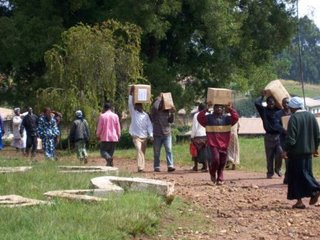Lattes and "Lemps"
What do paved roads, smoggy skies, lots of heat and humidity, lattes, Snickers bars, people speaking French, mosquitoes, go-carts, missionary team meetings, and one big Chinese restaurant have in common? Answer: They're all things that we saw, felt, tasted, met, experienced, talked to, or ate last week in Yaounde!
Yep, that's right. We arrived back here in Ndu in a cloud of red dust (dry season is definitely here, and the lingering, all-pervasive haze of dust in the air has begun) on Monday night after spending just under a week in Cameroon's capital city. We went, as Tommy said in the last post, to meet with other Baptist General Conference missionaries from around the country. We stayed at Wycliffe Bible Translators' SIL Center in Yaounde and had all our meetings there. It's a nice place, with a boarding school on campus (and a team of technicians who were able to repair my laptop---hooray!). We got to meet great people like Jim and Ina Smith who work with a health clinic in the town of Banyo, just a little northeast of where we live, and Rachel Scherer, a 21-year-old who's spent the last few months living in the village of Mbingo working with deaf students and doing a fantastic job, according to two other missionary families who live near her. (So, Ellie, there's great work to be done here in Cameroon too!)
It was really encouraging to hear reports about what God is doing---the incredible variety of things he's doing---through the BGC missionaries scattered throughout this country. One of the things I came away thinking about is how indispensable career missionaries are. When you think, for example, about Doug and Stephanie Lewis' work among the Fulani---a just-beginning-to-be-reached Muslim people group here---you realize how little can be accomplished in a short burst of activity but how much could be accomplished over a long haul. There's just no substitute for a lifetime commitment, and I can say as one short-termer that I'm inspired and challenged by the commitment I saw among most of the missionaries I met last week.
In addition to sitting in on strategizing and team-building meetings, we also got to play a lot. Our Peace Corps friend Ally told us about a coffee shop that we got to go to. It felt almost European---a big change from the “bush” where we live in the Northwest! We bought ice cream at a real(!) supermarket, and Charlie got to drive a go-cart with Philemon Yong, Doug Lewis, and lots of kids. We watched several episodes of “Lost” (season one) and spent a lot of time just hanging out.
One of the highlights of the week was the worship service for all the BGC missionaries on Sunday morning that the three of us got to lead. Charlie found a guitar, played some choruses, and led a time of corporate prayer, Tommy read Scripture, and I gave a brief meditation on the love of God from Romans 5:1-11. It was great to be worshiping together with others who care so deeply about God's global mission.
Now that we're back at CBTS, we have one more full week of classes left and then a week of final exams and then we're finished for the semester. (Can't wait to see the team from Bethlehem on December 31st! You guys will have a happy welcome at the airport!)
We'll blog more about it as the semester wraps up, I'm sure, but for now I think I speak for all three of us when I say I was really glad to see my students again after spending some time away. I got so many hand-shakes and back-slaps when I stepped back into my classrooms. Everyone was beaming. It felt great to be back among this seminary community.
On a humorous note, to give you some idea of how much fun and how frustrating it can be at the same time to be a teacher here, I gave an assignment last week in my Acts class and have just started grading the papers I received. This class is for second-year Certificate of Theology students---an eager, interested group of people who have about the equivalent of a U.S. seventh grade education. The assignment I gave was for my students to choose a block of text from the latter half of Acts and answer several questions about it in a short paper. One of the questions I wanted them to answer was what their chosen passage contributes to the larger whole of the entire book: Why did Luke include that section in his book? What role does it play in the macro-purpose and structure of Acts? One of my students wrote on Acts 20:7-12, the section that describes Eutychus' fall and Paul's rescue. Verse 8 says, “There were many lamps in the upper room where we were gathered,” and my student had this to say in his paper: “[Luke] want to show us that the Lamps are not exempted from hearing the word of God (v. 8).... I will like to know where Troas is found and know the kind of people that were there, whether they were only Lemps as found in verse 8 or they were other peoples.” Wow. In my comments on his paper, I tried to encourage my student's curiosity---and I referred him to a dictionary. :)
Grateful to all you pray-ers and supporters who keep making it possible for us to be here,
Wesley
P.S. I killed a chicken today for dinner tomorrow.
Yep, that's right. We arrived back here in Ndu in a cloud of red dust (dry season is definitely here, and the lingering, all-pervasive haze of dust in the air has begun) on Monday night after spending just under a week in Cameroon's capital city. We went, as Tommy said in the last post, to meet with other Baptist General Conference missionaries from around the country. We stayed at Wycliffe Bible Translators' SIL Center in Yaounde and had all our meetings there. It's a nice place, with a boarding school on campus (and a team of technicians who were able to repair my laptop---hooray!). We got to meet great people like Jim and Ina Smith who work with a health clinic in the town of Banyo, just a little northeast of where we live, and Rachel Scherer, a 21-year-old who's spent the last few months living in the village of Mbingo working with deaf students and doing a fantastic job, according to two other missionary families who live near her. (So, Ellie, there's great work to be done here in Cameroon too!)
It was really encouraging to hear reports about what God is doing---the incredible variety of things he's doing---through the BGC missionaries scattered throughout this country. One of the things I came away thinking about is how indispensable career missionaries are. When you think, for example, about Doug and Stephanie Lewis' work among the Fulani---a just-beginning-to-be-reached Muslim people group here---you realize how little can be accomplished in a short burst of activity but how much could be accomplished over a long haul. There's just no substitute for a lifetime commitment, and I can say as one short-termer that I'm inspired and challenged by the commitment I saw among most of the missionaries I met last week.
In addition to sitting in on strategizing and team-building meetings, we also got to play a lot. Our Peace Corps friend Ally told us about a coffee shop that we got to go to. It felt almost European---a big change from the “bush” where we live in the Northwest! We bought ice cream at a real(!) supermarket, and Charlie got to drive a go-cart with Philemon Yong, Doug Lewis, and lots of kids. We watched several episodes of “Lost” (season one) and spent a lot of time just hanging out.
One of the highlights of the week was the worship service for all the BGC missionaries on Sunday morning that the three of us got to lead. Charlie found a guitar, played some choruses, and led a time of corporate prayer, Tommy read Scripture, and I gave a brief meditation on the love of God from Romans 5:1-11. It was great to be worshiping together with others who care so deeply about God's global mission.
Now that we're back at CBTS, we have one more full week of classes left and then a week of final exams and then we're finished for the semester. (Can't wait to see the team from Bethlehem on December 31st! You guys will have a happy welcome at the airport!)
We'll blog more about it as the semester wraps up, I'm sure, but for now I think I speak for all three of us when I say I was really glad to see my students again after spending some time away. I got so many hand-shakes and back-slaps when I stepped back into my classrooms. Everyone was beaming. It felt great to be back among this seminary community.
On a humorous note, to give you some idea of how much fun and how frustrating it can be at the same time to be a teacher here, I gave an assignment last week in my Acts class and have just started grading the papers I received. This class is for second-year Certificate of Theology students---an eager, interested group of people who have about the equivalent of a U.S. seventh grade education. The assignment I gave was for my students to choose a block of text from the latter half of Acts and answer several questions about it in a short paper. One of the questions I wanted them to answer was what their chosen passage contributes to the larger whole of the entire book: Why did Luke include that section in his book? What role does it play in the macro-purpose and structure of Acts? One of my students wrote on Acts 20:7-12, the section that describes Eutychus' fall and Paul's rescue. Verse 8 says, “There were many lamps in the upper room where we were gathered,” and my student had this to say in his paper: “[Luke] want to show us that the Lamps are not exempted from hearing the word of God (v. 8).... I will like to know where Troas is found and know the kind of people that were there, whether they were only Lemps as found in verse 8 or they were other peoples.” Wow. In my comments on his paper, I tried to encourage my student's curiosity---and I referred him to a dictionary. :)
Grateful to all you pray-ers and supporters who keep making it possible for us to be here,
Wesley
P.S. I killed a chicken today for dinner tomorrow.





